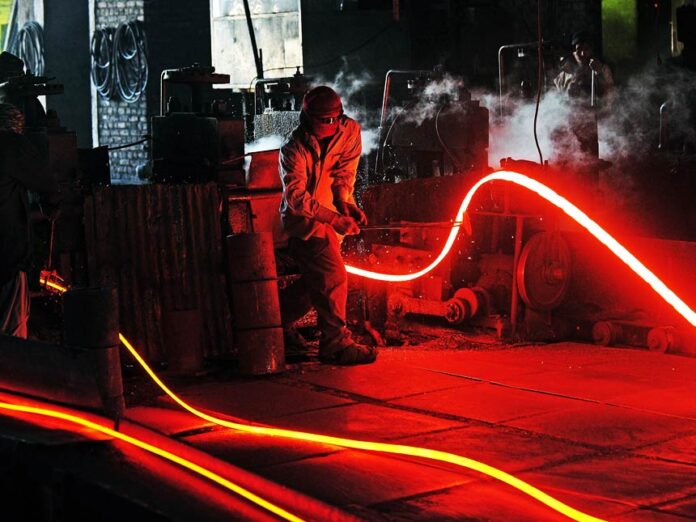ISLAMABAD: The local steel industry has claimed that the shortage of raw material in the international market was one of the major reasons behind the increase in the cost of steel, adding that the current situation is beyond the control of steel makers.
According to Pakistan Association of Large Steel Producers (PALSP), during the last and current fiscal year (FY20 and FY21), international as well as domestic market remained highly volatile; major fluctuations in prices of steel products were witnessed due to a confluence of factors such as commodities super cycle, in addition to massive infrastructure spending by leading economies to boost their indigenous economies coupled with short supply due to the Covid pandemic.
According to a report from JP Morgan, erratic out of control prices of raw material and finished products in the international market were witnessed owing to an evident inflationary commodities super cycle.
The prices of steel scrap in the international market have almost doubled in a single year between June 2020 and June 2021. The continuous increasing trend was observed in international prices of steel products as well.
In a statement, PALSP said that the average monthly price of steel scrap as per London Metal Exchange (LME) in June 2020 was $260, whereas the latest price for the month of June 2021 is $515.
Similarly, prices of Steel Rebar as per LME last year was $420, whereas in June 2021 FOB prices (excluding freight charges, local duties and taxes) are Turkey $770, China $898, and CIS $780, the association added.
Comparing prices with leading steel manufacturing nations, the local steel rebar prices being sold are still at 24 per cent discount to US domestic prices and approximately 17pc to 15pc less, than Turkey and China, respectively.
Computing the lowest June 2021 FOB price of rebars globally, Turkey at $770 FOB would equate to approximately $1120 CNF with 17pc GST without any duties added i.e. $770FOB including $60 freight, 5pc handling and LC charges, 10pc importers gross margin, and 17pc GST. Whereas local steel manufacturers are currently selling bars at prices of Rs150,500 including 17pc Sales Tax, totalling $950, i.e. 17pc cheaper than the Turkish rebar.
Despite facing losses and operating at very low margins, a surge in international prices of raw material leaves no option for local steel manufacturers to pass on costs to the consumer, the statement explains.
Pakistan’s steel industry is selling bars at far less price in comparison to prices by absorbing massive cost increases through reducing their profit margins from 8pc to 3pc that were 19pc to 12pc form 2015-2018, respectively.
Further, the local steel industry has absorbed a majority of inflationary pressures such as increasing scrap prices in the international market and selling bars in the domestic market at far less price in comparison to prices world over. Despite incurring a massive increase in the cost of electricity leading to an increased cost of doing business, local steel manufacturers are still providing cost effective material to the construction sector.
The energy cost in Pakistan, a vital cost component for steel making, is double to that of the regional peers. Industrial unit effective price in Pakistan ranges between 12.28¢/kwh -16.14¢/kwh, whereas in Vietnam (7.3¢/kwh), India (7.1¢/kwh and 7.8¢/kwh in Maharashtra and Punjab, respectively) and at 6.1¢/kwh in Xinjiang China.
Moreover, steel manufacturers, who were already experiencing shock waves of fluctuations in steel prices in the international market, along with a surge in energy prices, now face a withdrawal of FED on erstwhile FATA/PATA as announced in the recent budget of FY22.
The associated lamented that the decision was taken without taking all stakeholders into account, warning that the irrecoverable consequences of the decision will result in closure of the domestic steel industry and immediate cancellation of Chinese and domestic investments, resulting in a lost decade for the Nation’s nascent steel industry.
“The irresponsible action of removal of FED on erstwhile FATA steel units will give huge advantage amounting to over Rs25, 000 to the steel industry of the tribal areas in comparison to the rest of the country. This will lead to more distortion and unfair competition in the domestic market.”
The statement urged the government to reconsider the industry’s proposed ‘One nation, one policy’ initiative, which claims to be able to bring down steel prices across Pakistan by Rs25,000 overnight to equate sales tax across the nation as in tribal areas.





Steel prices have already been rising above pre-recession levels. In an effort to hold supplies stable, Steel producers in the United States have been offered price increases. Steel Industry experts say that increased demand, higher investments in mill sites and new processing technologies, along with increased government support are all contributing factors to the increase in raw material costs. Some analysts say that the US government may ease off its pressure on Steel producers as the economy and consumer spending recovers. Steel costs continue to rise but the positive effects of lower costs will soon be offset by higher costs from increased demand.